Related Research Articles

Catan: Seafarers, or Seafarers of Catan in older editions, is an expansion of the board game Catan for three to four players. The main feature of this expansion is the addition of ships, gold rivers, and the pirate to the game, allowing play between multiple islands. The expansion also provides numerous scenarios, some of which have custom rules. The Seafarers rules and scenarios are also, for the most part, compatible with Catan: Cities & Knights and Catan: Traders & Barbarians.

The Spiel des Jahres is an award for board and card games, created in 1978 with the purpose of rewarding family-friendly game design, and promoting excellent games in the German market. It is thought that the existence and popularity of the award was one of the major drivers of the quality of games coming out of Germany, particularly in the 1980s and 1990s. A Spiel des Jahres nomination can increase the typical sales of a game from 500 to 3,000 copies to around 10,000; and the winner can usually expect to sell to as large as 30 million copies.
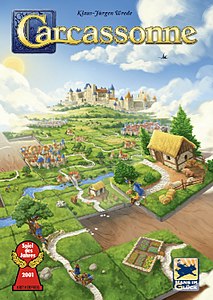
Carcassonne is a tile-based German-style board game for two to five players, designed by Klaus-Jürgen Wrede and published in 2000 by Hans im Glück in German and by Rio Grande Games and Z-Man Games (currently) in English. It received the Spiel des Jahres and the Deutscher Spiele Preis awards in 2001.

Reiner Knizia is a prolific German-style board game designer.
In tabletop games and video games, game mechanics are the rules that govern and guide the player's actions, as well as the game's response to them. A game's mechanics thus effectively specifies how the game will work for the people who play it.

Evo: The Last Gasp of the Dinosaurs is a German-style board game for three to five players, designed by Philippe Keyaerts and published by Eurogames. The game won the GAMES Magazine award for Game of the year 2002. It was nominated for the Origins Award for Best Graphic Presentation of a Board Game 2000. In 2004 it was nominated for the Hra Roku. The game went out of print in 2007, and a second edition was released in 2011.

Dungeonquest is a fantasy adventure board game originally published in Sweden in 1985 by Alga AB as Drakborgen, and subsequently published in English by Games Workshop in 1987.
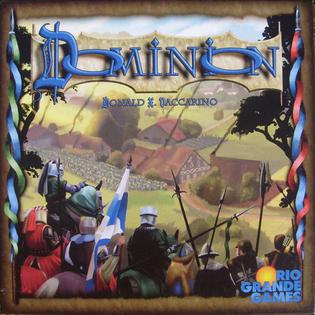
Dominion is a deck-building game created by Donald X. Vaccarino and published by Rio Grande Games. It was the first game of its kind, and inspired a genre of games building on its central mechanic. Each player begins with a small deck of cards, which they improve by purchasing cards from a common supply that varies from game to game. Cards can help the player's deck function, impede their opponents, or provide victory points.

Heroscape is an expandable turn-based miniature wargaming system originally manufactured by Milton Bradley Company from 2004 to 2008, and later by Wizards of the Coast from 2008 until it was discontinued in November 2010. The game is played using pre-painted miniature figures on a board made from interlocking hexagonal tiles, allowing for the construction of an interchangeable and variable 3D landscape. This system and the relatively high production quality of the game materials are lauded by fans even years after the game was discontinued.

A tile-matching video game is a type of puzzle video game where the player manipulates tiles in order to make them disappear according to a matching criterion. In many tile-matching games, that criterion is to place a given number of tiles of the same type so that they adjoin each other. That number is often three, and these games are called match-three games.
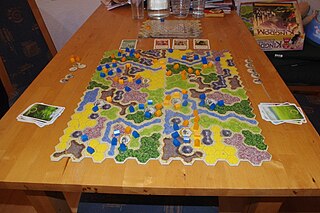
Kingdom Builder is a strategy board game designed by Donald X. Vaccarino, published in 2011 by Queen Games with illustrations by Oliver Schlemmer in German, British and international versions. A Finnish-Swedish version was released in 2012 by lautapelit.fi.
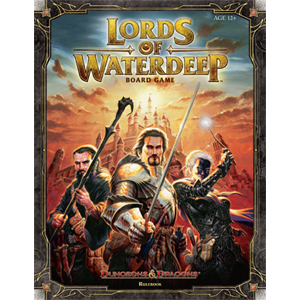
Lords of Waterdeep is a German-style board game designed by Peter Lee and Rodney Thompson and published by Wizards of the Coast in 2012. The game is set in Waterdeep, a fictional city in the Forgotten Realms campaign setting for the Dungeons & Dragons role-playing game. Players take the role of masked rulers of Waterdeep, deploying agents and hiring adventurers to complete quests and increase their influence over the city.
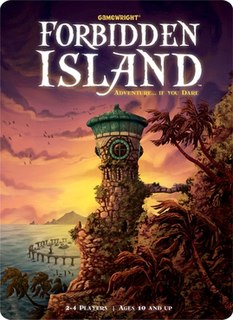
Forbidden Island is a cooperative board game developed by Matt Leacock and published by Gamewright Games in 2010. Two to four players take the roles of different adventurers, moving around a mysterious island, looking for hidden treasures as the island sinks around them. All players win if they find all the hidden treasures and they all make it back to the helicopter and fly away, and they all lose if they cannot.

Splendor is a multiplayer card-based board game, designed by Marc André and illustrated by Pascal Quidault. It was published in 2014 by Space Cowboys, Asmodee. Players are gem merchants of the Renaissance, developing gem mines, transportation, and shops to accumulate prestige point. Spelendor received positive reviews and received numerous awards, including winner of Golden Geek Best Family Board Game, and nominated for the Spiel des Jahres Game of the Year in 2014. The game also received a mobile application and an expansion released in 2017.

Colt Express is a railway-themed family board game designed by Christophe Raimbault, Illustrated by Ian Parovel and Jordi Valbuena, published in 2014 by Ludonaute and distributed by Asmodee.
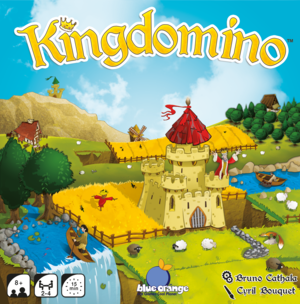
Kingdomino is a 2016 tile board game for 2-4 players designed by Bruno Cathala and published by Blue Orange Games. In this 15-20 minute, family-oriented game, players build a five by five kingdom of oversized domino-like tiles, making sure as they place each tile that one of its sides connects to a matching terrain type already in play. The game was critically successful and won the 2017 Spiel des Jahres award, and was followed by several spin-offs and expansions.
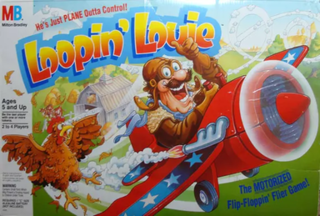
Loopin' Louie, is an interactive electronic board game designed by Carol Wiseley and published by Milton Bradley in 1992. It was given the Kinderspiel des Jahres award in 1994. Although the game is designed for a maximum of 4 players, unofficial modifications were made by modders to increase the maximum number of players to eight. A Star Wars variation called "Loopin' Chewie" was produced by Hasbro in 2015.

Isle of Skye: From Chieftain to King is a tile-laying board game designed by Alexander Pfister and Andreas Pelikan that was published in 2015. It uses the Isle of Skye as its setting, with players representing clan chieftans each vying to build a kingdom.

Cartographers is a roll and write board game designed by Jordy Adan and published in 2019 by Thunderworks Games. It is part of the Roll Player universe. In the game, players aim to draw terrains based on drawn cards that award points based on the relevant letter cards. The game received positive reviews, and was nominated for the Kennerspiel des Jahres, but lost to The Crew. It was also runner-up to Parks for the Best Family Game of the 2019 Board Game Quests Awards. An app for solitary play was released in 2020.
References
- 1 2 3 Mastrangeli, Tony (14 June 2021). "Dragomino Wins the Kinderspiel des Jahres 2021". Board Game Quest. Retrieved 24 November 2021.
- 1 2 3 4 5 6 7 8 9 Elder, Jonathan (14 January 2021). "Dragomino Game Review: Gotta Hatch Them All!". Meeple Mountain. Retrieved 24 November 2021.
- 1 2 3 4 Law, Keith (29 December 2020). "Dragomino turns a beloved board game into a child-friendly treat". Paste . Retrieved 24 November 2021.
- 1 2 3 Kelm, Jason (29 October 2020). "Dragomino Review". Board Game Quest. Retrieved 24 November 2021.
- ↑ Laeuchli, Naomi (12 December 2020). "Dragomino Is a Kid-Friendly Version of Kingdomino, With a Twist". Casual Game Revolution. Retrieved 24 November 2021.